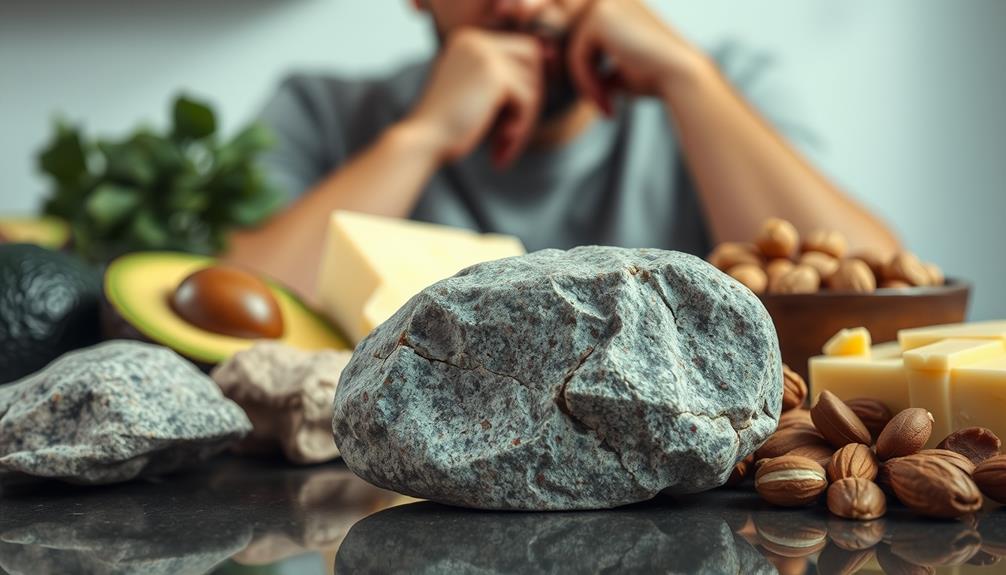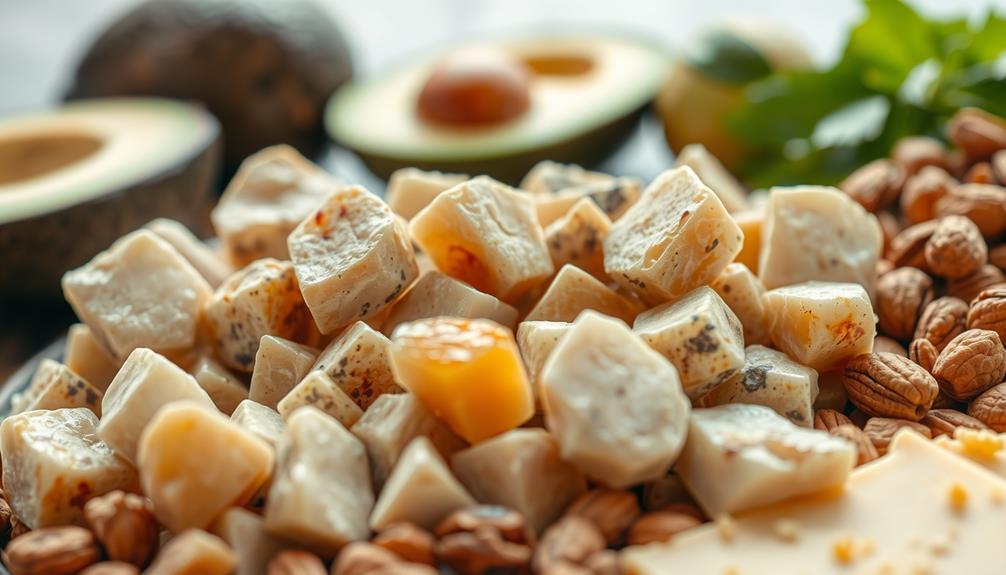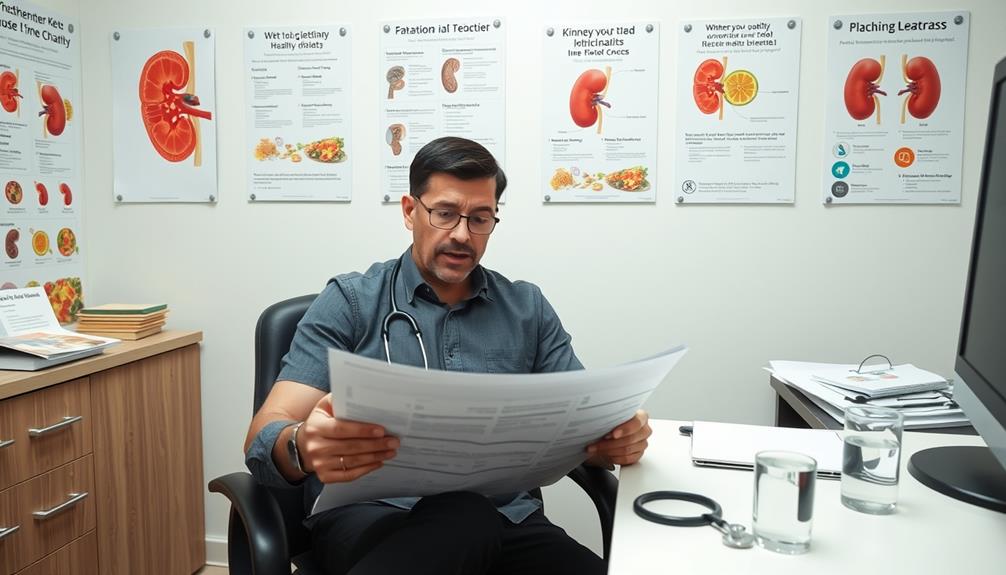Yes, the keto diet can increase your risk of kidney stones. With an incidence rate of about 5.9% among those on the diet, that's much higher than the general population's 0.3%. Factors like high protein intake and dehydration contribute to this risk. When you restrict carbs, you might not drink enough water, which can elevate uric acid and calcium levels in your urine, promoting stone formation. To minimize risks, stay hydrated and monitor your diet closely. There's more to understand how to protect your kidney health while following keto.
Key Takeaways
- The keto diet increases uric acid levels, raising the risk of painful kidney stone formation.
- Incidence of kidney stones in keto dieters is significantly higher, ranging from 3% to 10%.
- Low carbohydrate intake can lead to dehydration, which elevates the concentration of stone-forming substances in urine.
- Chronic metabolic acidosis on keto may decrease calcium reabsorption, contributing to stone formation.
- Adequate hydration and dietary modifications are essential to help prevent kidney stones while on the keto diet.
Understanding the Keto Diet

The ketogenic diet, often referred to as "keto," is a high-fat, low-carbohydrate eating plan designed to shift your body into a state of ketosis. In ketosis, your body relies on fat as its primary energy source instead of carbohydrates, which can aid in weight loss and management of Type 2 diabetes.
However, this diet's restrictive nature may lead to nutritional deficiencies, particularly in essential vitamins, minerals, and fiber. To support overall health while on this diet, it's vital to incorporate effective strategies for weight loss that promote sustainable changes.
While the keto diet has gained popularity, it's important to evaluate potential side effects. For instance, low carb diets can increase uric acid levels, which may contribute to metabolic acidosis. This condition can complicate kidney health and potentially lead to kidney stones.
To mitigate these risks, maintaining adequate fluid intake is vital. Proper hydration helps dilute substances in urine that could form stones, reducing your risk.
Although the keto diet may offer short-term benefits, its long-term safety and overall health effects are still subjects of ongoing research. Careful planning is essential to avoid nutritional deficiencies while following this diet, ensuring that you achieve your health goals without compromising your well-being.
Kidney Stones and Their Causes

Kidney stones come in different types, with calcium oxalate and uric acid being the most common. Understanding the specific risk factors—like dehydration and high protein intake—can help you identify potential issues, especially if you're on a ketogenic diet.
A well-managed budget can also aid in maintaining a healthy lifestyle, as it allows for better planning of food choices and hydration.
Let's explore how these factors contribute to stone formation and what you can do to reduce your risk.
Types of Kidney Stones
When it comes to kidney stones, understanding the different types can help you manage your health better, especially if you're on a ketogenic diet. The primary types of kidney stones you'll encounter are:
– Uric acid stones: These account for about 48.7% of cases and are linked to high uric acid levels, often exacerbated by the high protein intake in ketogenic diets.
Additionally, a careful selection of cold medications may also influence your overall kidney health.
- Calcium-based stones: Making up around 36.5% of cases, these stones can form due to hypercalciuria, which can be triggered by chronic metabolic acidosis associated with the diet.
- Mixed stones: Approximately 27.8% of kidney stones formed in ketogenic dieters are a combination of uric acid and calcium-based stones.
Factors like dehydration and low urine citrate levels greatly contribute to the formation of these stones.
When consuming a ketogenic diet, it's crucial to stay hydrated and monitor your intake of foods that could increase your risk of developing kidney stones.
Risk Factors Explained
While following a ketogenic diet, you might unknowingly increase your risk of developing kidney stones due to several interconnected factors. One major issue is high protein intake, which can raise calcium and uric acid levels in your urine. Elevated levels of these substances create a perfect storm for stone formation.
Individuals with certain mental health disorders, such as BPD, may experience additional challenges in managing dietary changes that can exacerbate health issues.
Dehydration often accompanies the keto lifestyle, as the diet's low carbohydrate content can lead you to drink less water. This dehydration results in higher concentrations of metabolic byproducts that promote kidney stones.
Additionally, the ketogenic diet can lower your urinary citrate levels, changing your urinary pH and fostering an environment for uric acid and calcium stones.
Chronic metabolic acidosis, a potential result of a keto diet, can also lead to hypercalciuria, causing excessive calcium excretion in your urine. This greatly increases the likelihood of forming calcium-based stones.
Studies indicate that the incidence of kidney stones among those on ketogenic diets ranges from 3% to 10%, which is alarmingly higher than the general population's rate of about 0.3%.
How Keto Influences Kidney Health

The impact of the ketogenic diet on kidney health is a growing concern for many individuals embracing this low-carb lifestyle. While the keto diet may help with weight loss and energy levels, it also comes with potential dangers that you shouldn't ignore.
Mammography aims to detect breast cancer early for better treatment outcomes, and similarly, early monitoring of kidney health can prevent complications.
- Increased uric acid levels can lead to painful kidney stones.
- Chronic metabolic acidosis may cause hypercalciuria, resulting in decreased calcium reabsorption.
- Low urinary pH can facilitate the crystallization of uric acid, raising your risk of stone formation.
As you adhere to a high-protein and low-carb diet, the incidence of kidney stones rises considerably, with studies showing rates of up to 5.9% compared to just 0.3% in the general population.
The types of stones you might encounter include uric acid stones, which account for almost half of the cases, and calcium-based stones, which are also prevalent.
To safeguard your kidney health, it's essential to regularly monitor urine calcium-to-creatinine ratios and maintain proper hydration. Being proactive can help you enjoy the benefits of the keto diet while reducing the risk of developing kidney stones.
Incidence of Kidney Stones in Keto Users

If you're on a ketogenic diet, you might want to be aware that the incidence of kidney stones among users is considerably higher than in the general population.
Research shows that around 5.9% of keto dieters develop stones, with various types like uric and calcium-based stones being common.
This increase in risk may be linked to dietary factors that affect mineral balance and hydration levels, making it essential to stay informed about trust issues with boyfriends in relation to lifestyle changes.
Understanding the risk factors and prevention strategies can help you manage your kidney health while following this diet.
Prevalence Among Ketogenic Users
Among those following a ketogenic diet, the estimated incidence of kidney stones is particularly higher than in the general population, reaching about 5.9%. This prevalence is alarming, especially since adults experience a rate of 7.9%, while children are slightly lower at 5.8%.
The types of kidney stones mainly found in keto users include uric acid stones (48.7%) and calcium-based stones (36.5%).
It's essential to take into account the financial implications of healthcare needs, particularly if complications arise from diet-related issues. For instance, caregivers may need to explore options for financial aid sources if hospitalization becomes necessary due to kidney stone complications.
To visualize the risks associated with this diet, reflect on:
- The discomfort of passing a kidney stone, a painful experience you don't want to endure.
- The need for frequent monitoring of your urine calcium-to-creatinine ratios to stay ahead of potential issues.
- The dietary adjustments you might've to make to lower your risk of developing these stones.
Given that the incidence of kidney stones among ketogenic diet users is considerably higher than the general population—where rates are only around 0.3% for men and 0.25% for women—it's vital to be aware of these risks.
Regular monitoring and proper dietary adjustments can help minimize the likelihood of developing kidney stones while enjoying the benefits of a ketogenic diet.
Types of Kidney Stones
Kidney stones can take various forms, each with distinct causes and implications for those on a ketogenic diet. The incidence of kidney stones among keto users is considerably higher than in the general population, with about 5.9% affected.
You might encounter different types of stones, including uric stones, which comprise 48.7% of cases, and calcium-based stones, making up 36.5%. Additionally, 27.8% of cases involve mixed uric acid and calcium-based stones. This increased risk may be attributed to the diet's high protein content, which can lead to metabolic changes.
Understanding the importance of risk management strategies for dietary choices is essential for maintaining kidney health.
High protein intake in ketogenic diets can lead to metabolic acidosis, resulting in conditions like hypercalciuria and low urinary citrate levels. These conditions increase your risk of forming kidney stones.
In fact, studies show that incidence rates vary widely, ranging from as low as 0.98% to as high as 25% among ketogenic diet users. Understanding the types of kidney stones and their prevalence can help you make informed choices about your diet.
Risk Factors and Prevention
Understanding the risk factors associated with kidney stones is essential for anyone following a ketogenic diet. Research shows that the incidence of kidney stones in keto users is around 5.9%, considerably higher than the general population.
Key factors contributing to this include:
- High protein intake leading to increased urine calcium
- Dehydration from reduced carbohydrate consumption
- Low urinary pH, promoting stone formation
These factors create an environment conducive to kidney stones, particularly uric and calcium-based stones, which are common in ketogenic dieters.
To mitigate these risks, it's imperative to adopt preventive measures. Regular monitoring of your urine calcium levels can help you stay ahead of potential issues.
Additionally, maintaining a clean environment is essential for overall health, similar to how air purifier maintenance enhances indoor air quality. Staying well-hydrated is critical; drink plenty of fluids to counteract dehydration.
Moreover, consider using potassium citrate, which can help alkalize your urine, making it less favorable for stone formation.
Types of Kidney Stones Linked to Keto

Examining the types of kidney stones linked to the ketogenic diet reveals a concerning trend. Among those on keto, uric acid stones are particularly prevalent, accounting for 48.7% of cases. The high protein intake typical of the ketogenic diet can greatly elevate uric acid levels, especially in individuals with low urine pH, leading to increased stone formation.
Furthermore, maintaining proper hydration is crucial, as dehydration can concentrate minerals in urine, further contributing to stone development. Incorporating natural remedies such as vital oils like eucalyptus oil may support overall health during this diet.
Calcium-based stones represent 36.5% of cases, often resulting from chronic metabolic acidosis associated with keto, which can trigger hypercalciuria. This condition amplifies the risk of developing calcium oxalate stones.
In addition, the incidence of kidney stones among keto followers is alarmingly high at 5.9%, compared to just 0.3% for men and 0.25% for women in the general population.
Dehydration is another critical factor exacerbating this issue. It concentrates calcium and uric acid in urine, further elevating the risk of stone formation.
If you're on a ketogenic diet, it's important to be aware of these types of kidney stones and the underlying mechanisms, as they can lead to serious health complications. Understanding these connections can help you make informed dietary choices.
Preventive Measures for Kidney Health

To maintain kidney health while following a ketogenic diet, it's essential to adopt preventive measures that can greatly reduce the risk of stone formation.
Regular monitoring is key; keeping track of your urine calcium-to-creatinine ratios and scheduling ultrasonography can help detect any renal complications early on.
It's also vital to prioritize hydration, as adequate fluid intake dilutes urine and flushes out metabolic byproducts, markedly lowering the chances of kidney stone formation.
Consider these preventive measures:
- Urine alkalization with potassium citrate to increase urine pH, which helps prevent uric acid stones.
- Dietary modifications by incorporating plant-based proteins instead of high animal protein, lowering uric acid levels.
- Routine checks for metabolic disorders and, if necessary, referrals to nephrology specialists for ongoing care.
Importance of Hydration on Keto

How essential is hydration when you're on a ketogenic diet? It's vital! Adequate hydration helps dilute your urine, reducing the concentration of substances that can lead to kidney stones.
When you're dehydrated, your body can elevate protein and uric acid levels, increasing your risk of developing kidney stones—reported in 3-10% of those on a ketogenic diet.
Drinking enough fluids maintains healthy citrate levels, which inhibit calcium crystallization and stone formation. Low citrate levels are common among keto dieters, making hydration even more important.
You should aim for at least 2-3 liters of water daily to support kidney health and avoid complications from dehydration.
To boost your hydration, consider adding lemon juice to your water. This not only enhances the flavor but also helps reduce calcium aggregation in your urine, providing an additional preventive measure against kidney stones.
Remember, maintaining proper hydration isn't just about drinking more; it's about making smart choices to keep your body functioning effectively while you enjoy the benefits of a ketogenic diet.
Stay hydrated and keep those kidneys healthy!
Seeking Medical Advice Before Keto

While staying hydrated is important on a ketogenic diet, it's equally important to seek medical advice before making such a significant dietary change. Consulting a healthcare provider can help you assess your individual risk factors, especially if you have a history of kidney stones or pre-existing kidney conditions. They can recommend necessary monitoring or adjustments to minimize complications.
Consider discussing:
- Dietary preferences: How your food choices may impact your health.
- Nutrient deficiencies: Ensuring you get essential vitamins and minerals.
- Preventive measures: Such as potassium citrate supplementation to maintain healthy urine pH.
Your healthcare provider might suggest increased hydration and regular urine analysis to monitor kidney function and stone formation risk.
Being proactive is key, especially when adhering to a ketogenic diet, as it can alter your body's chemistry. Don't overlook the signs of kidney stones and make sure to schedule follow-up appointments.
Seeking medical advice not only empowers you to make informed choices but also helps you enjoy the benefits of the keto diet while minimizing potential risks. Taking these steps can lead to a healthier, safer dietary journey.
Frequently Asked Questions
Why Does a Keto Diet Cause Kidney Stones?
A keto diet increases your kidney stone risk mainly due to higher protein intake, which raises uric acid levels. Dehydration from reduced carbs further concentrates stone-forming substances in your urine, promoting stone formation.
Is Keto Hard on Your Kidneys?
If your kidneys are a bustling factory, the keto diet might throw a wrench in the works. It can strain them with higher protein and dehydration, so you've gotta stay mindful of your hydration and health.
Which Diet Is Most Likely to Cause Kidney Stones?
If you're considering diets, high-protein and low-carb options, like the ketogenic diet, often increase the risk of kidney stones. Staying hydrated and monitoring oxalate intake can help minimize this risk for you.
What Are the Symptoms of Kidney Ketosis?
When you're in ketosis, you might experience symptoms like severe abdominal pain, hematuria, frequent urination, and even flank pain. Nausea and vomiting can also occur if kidney stones obstruct your urinary tract.
Conclusion
In summary, while the keto diet can offer weight loss benefits, it's essential to stay mindful of your kidney health. After all, you wouldn't drive a car without checking the oil, right? By staying hydrated and understanding the potential risks, you can enjoy the perks of keto without the worry of kidney stones. So, make informed choices, listen to your body, and consult a healthcare professional if you're considering this low-carb lifestyle. Your kidneys will thank you!









